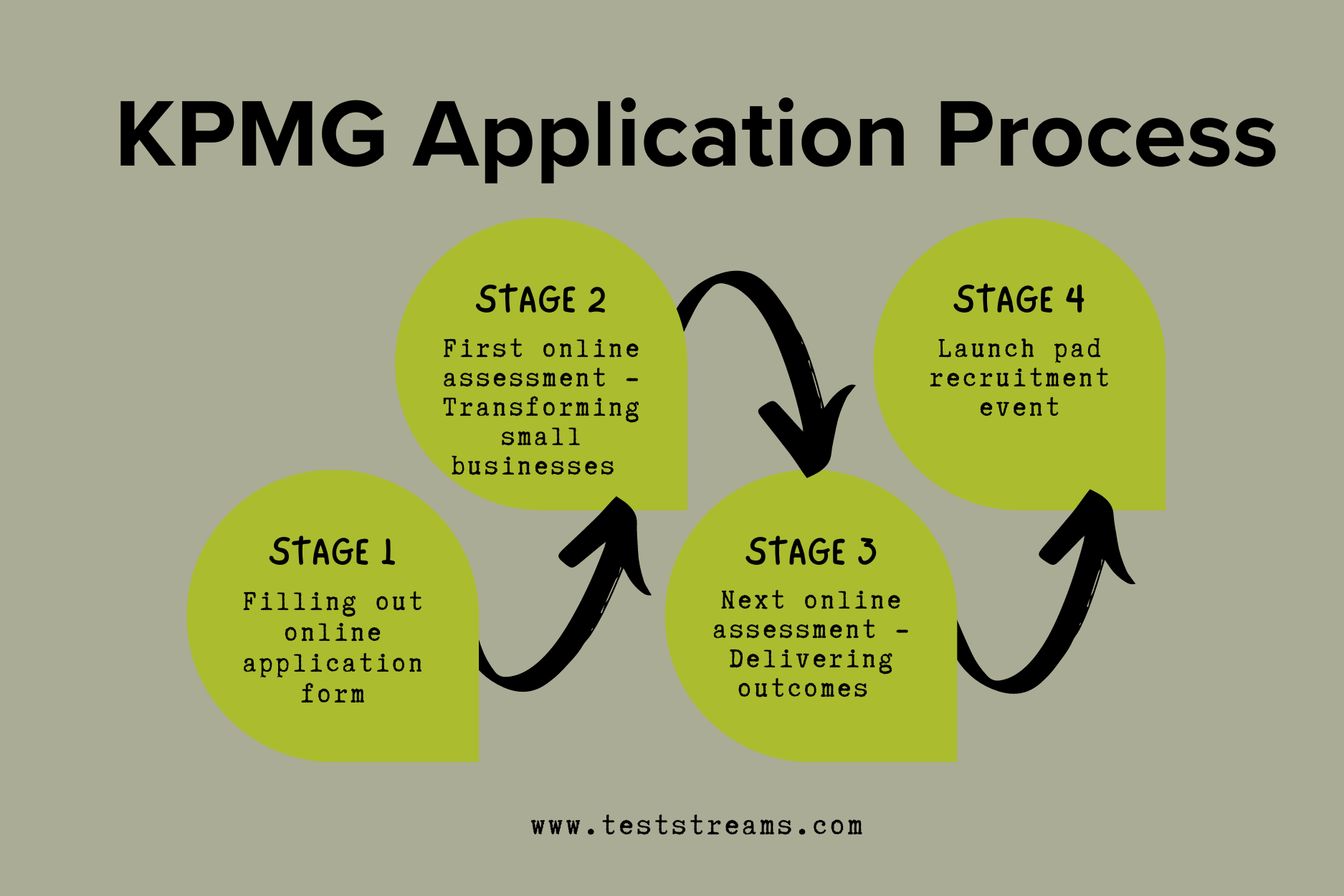Are you gearing up to take the KPMG Aptitude Test? Whether you’re a seasoned candidate or a first-timer, preparing effectively is the key to success.
In this comprehensive guide, we’ll walk you through everything you need to know to excel in your KPMG Aptitude Test. Plus you get past questions and an online test practice to help you get the much preparation you need.
What is the KPMG Aptitude Test?
The KPMG aptitude test is the qualifying assessment taken by candidates to qualify for the KPMG Programmes. It consists of a series of virtual tests and physical recruitment activities.
The KPMG application process consists of a mixture of situational judgment questions, verbal reasoning test, group and analysis exercise,and numerical reasoning skills.
The aptitude tests and application processes assess the strength of candidates to know if they align with the company’s trajectory and have the potential to thrive.
Why You Should Practice For KPMG Aptitude Test
KPMG is one of the “Big Four” accounting firms, along with Deloitte, PricewaterhouseCoopers (PwC), and Ernst & Young (EY). As a top-leading accounting company in the world, KPMG prides itself on offering a suitable and comfortable working environment for its employees. This reputation for excellence and employee satisfaction makes KPMG a highly sought-after employer.
Because of these reasons, the company has a lot of candidates flocking in every time their employment window is open. The competition is fierce, with thousands of highly qualified individuals vying for a limited number of positions. To stand out in this crowded field, it is essential to be well-prepared, especially for the KPMG Aptitude Test, which is a critical component of the hiring process.
It is important that you practice for the KPMG Aptitude test because it gives you a significant advantage over other candidates. Familiarity with the test format, question types, and time constraints allows you to perform confidently and efficiently.
Here are other reasons why you should practice for the KPMG aptitude test and assessment:
Improved Skills
Regular practice helps improve your cognitive abilities, critical thinking skills, and problem-solving aptitude. These are precisely the areas the KPMG Aptitude Test evaluates, so honing these skills is crucial for success.
Reduced Anxiety
Knowing what to expect on the test day reduces anxiety and stress. Practice sessions simulate the actual test environment, making you more comfortable and composed during the real exam.
Higher Chances of Success
The more you practice, the better your chances of scoring high on the test. High scores can set you apart from other candidates and increase your likelihood of advancing to the next stages of the recruitment process.
Understanding Weaknesses
Practicing the KPMG aptitude tests help identify your weak areas. By focusing on and improving these areas, you can turn potential weaknesses into strengths, ensuring a more balanced and comprehensive performance.
Practicing for the KPMG Aptitude Test is not just about passing the test; it’s about maximizing your potential and ensuring you are fully prepared to take on one of the most competitive recruitment processes in the professional services industry. Investing time in preparation will not only boost your confidence but also significantly enhance your chances of securing a coveted position at KPMG.
PRACTICE FOR YOUR KPMG APTITUDE TEST WITH A PRACTICE TEST NOW!
How hard is the KPMG Test?
While the KPMG aptitude test can be challenging, thorough preparation can significantly ease the difficulty. The key lies in familiarising yourself with the format and sharpening the skills assessed.
If you are adequately prepared, the KPMG test will not be hard.
While some candidates find it a breeze, others report struggling to complete it within the time limit. The difficulty ultimately hinges on how well you prepare beforehand.
Just like any exam, practising beforehand can significantly boost your confidence and test-taking skills.
Careers at KPMG
KPMG isn’t just another accounting firm; it’s a springboard to a fulfilling career. KPMG offers a vast array of opportunities across various disciplines. Whether you’re a seasoned professional or a budding graduate, KPMG provides a platform to learn, grow, and make a lasting impact.
Here is a list of careers at KPMG:
- Auditors
- Tax professionals
- Advisory
- Enterprise Risk Management (ERM)
- Forensic accountants
Academic Requirements for KPMG
KPMG welcomes applications from bright minds across various academic backgrounds. The specific requirements depend on the role you’re interested in and your career stage (graduate vs experienced professional).
Here’s a breakdown to get you started:
For Undergraduates:
- Grade B GCSE Maths and grade B GCSE English Language or equivalent
- 300 UCAS Tariff points* or equivalent
- On track to achieve a 2:1 degree in any discipline
KPMG only considers your GCSE grades and top three A-Level grades and does not accept General Studies.
See other requirements here >>> Academic Requirements for KPMG Undergraduate Programme.
For Graduate Trainee and Early Careers:
- A minimum of a Second-Class Upper Division from a recognised university
- A minimum of 5 O’ Level credits (including English and Mathematics)
- A Bachelor’s degree in a relevant discipline
- Not exceeded 28 years of age at the time of application.
- Completed the National Youth Service Corps (NYSC) programme.
- A minimum of Second-Class Upper degree from the Nigerian Law School if you are a law graduate.
See other requirements here >>> Requirements for KPMG Graduate Trainee Programme.
For Experienced Professionals:
- Below are the stated requirements:
- A minimum of second class upper in any discipline at the bachelor’s degree.
- Below 32 years of age.
- At least five credits in one sitting, including Mathematics and English Language, at the O’ Levels.
- A minimum of three (3) years of relevant experience
See other requirements here >>> Requirements for KPMG Experienced Professional Programme.
How To Apply For KPMG

Applying for KPMG is different from other programmes. Other programmes require you to submit a CV and follow up with attending an assessment centre.
When applying KPMG, you’ll move through a number of online tasks split into stages. This will help the recruiters select candidates whose strengths align with the company’s trajectory and have the potential to thrive.
Stage 1: Filling Out the Application Form
Take your time and carefully review the job description. Tailor your resume and cover letter to highlight relevant skills and experiences that align with KPMG’s requirements. Your form should highlight your accomplishments in quantifiable formats whenever possible. Use strong action verbs and specific examples to demonstrate the impact you’ve made in previous roles.
Always ensure your application is free of typos and grammatical errors. A polished application creates a positive first impression.
For details and application, visit the Official Webpage of the KPMG Nigeria Graduate Trainee Programme.
Stage 2: First Online Assessment
In the second stage of the application process, you will undergo the situational judgment test and numerical and verbal reasoning test.
You should also note that KPMG often uses Cubiks, a platform known for its timed assessments. Make sure you familiarise yourself with Cubiks question styles by researching online resources and practising with sample tests.
In this stage, you should also focus on core areas like numerical reasoning (data analysis, interpreting charts), verbal reasoning (reading comprehension, identifying key points), and situational judgment (decision-making in work scenarios).
Get targeted practice questions for the KPMG Aptitude Test.
Stage 3: Second Online Assessment
Depending on the role, you might be required to submit additional documents, such as writing samples, project presentations, or reference letters.
Ensure these materials are well-organised and demonstrate your skills and qualifications.
Launch Pad Recruitment Event
The Launch Pad recruitment event at KPMG is the final stage of the application process for many roles. It’s essentially an assessment centre where you’ll participate in a series of activities designed to evaluate your skills and suitability for the position
Here is what you can expect:
- Group Exercise: Collaborate with other candidates to tackle a business challenge. Showcase your communication, teamwork, and problem-solving skills. This assesses your communication, teamwork, problem-solving abilities, and how you handle pressure.
- Analysis Exercise: Demonstrate your analytical abilities by interpreting data and drawing insightful conclusions. This assesses your analytical thinking, critical thinking, and presentation skills.
- Partner Interview: This one-on-one interview allows you to delve deeper into your experience and career aspirations. This provides an opportunity to delve deeper into your experience, career aspirations, and motivations for applying to KPMG.
- Networking Sessions: You’ll have the chance to interact with KPMG professionals from different departments. This allows you to gain valuable insights into the company culture, work environment, and potential career paths within KPMG.
By understanding each stage and actively preparing, you’ll be well-equipped to showcase your skills and impress the KPMG recruitment team. Remember, every step is an opportunity to demonstrate your potential and take a step closer to your dream job.
How To Prepare and Pass the KPMG Assessment
Acing the KPMG assessment is your first step towards landing your dream job. While it might seem challenging, with focused preparation, you can confidently showcase your skills.
Know the Format
KPMG often uses Cubiks, known for its specific question styles and time constraints. Research Cubiks assessments and practice with sample tests to get comfortable with the format. This will help you develop strategies to answer questions quickly and accurately under pressure.
Sharpen Your Skills
Focus on core areas like numerical reasoning, verbal reasoning, and situational judgment. Practice tests and targeted exercises can significantly improve your performance. Here’s where to focus:
- Numerical Reasoning: Brush up on mental maths, percentages, and data analysis skills. Practice working with charts, graphs, and tables under time pressure.
- Verbal Reasoning: Enhance your reading comprehension and critical thinking skills. Practice summarising information and identifying key points in passages.
- Situational Judgment: Prepare for questions that assess your judgment and decision-making skills in work-related scenarios. Think strategically and consider the potential consequences of your choices.
Regular Practice
Regular practice with sample questions is key to improving your performance and managing test anxiety:
- Dedicated Practice Time: Regularly work on practice tests and sharpen your core skills.
- Simulate the Test Environment: Find a quiet space with minimal distractions and set a timer to mimic the actual test conditions.
- Learn from Your Mistakes: Analyze your practice test results to identify areas for improvement. Focus on these areas during subsequent practice sessions.
Research The Company
Research the company’s history, values, culture, services, and recent developments. Demonstrate your genuine interest and knowledge during the interview by discussing how your skills and goals align with KPMG’s mission.
Show genuine interest and knowledge by researching the company’s:
- History
- Values
- Culture
- Services
- Recent Developments
This demonstrates your initiative and allows you to discuss during the interview how your skills and goals align with KPMG’s mission.
GET KPMG PAST QUESTIONS NOW!
How to Pass the KPMG Interview
Acing the KPMG interview is your passport to a rewarding career at this leading professional services firm. While it might seem nerve-wracking, with the right preparation, you can impress the interviewers and stand out from the crowd.
KPMG interviews typically follow a structured format, often involving:
- Behavioural questions: These questions delve into your past experiences and assess your skills and problem-solving abilities using the STAR method (Situation, Task, Action, Result). Be prepared to discuss specific examples that showcase your strengths and how you overcame challenges.
- Case studies: KPMG may present you with a business scenario and ask you to analyze the situation, identify key issues, and propose solutions. Demonstrate your analytical and problem-solving skills by asking clarifying questions and presenting a well-structured approach.
- Technical questions: Depending on the specific role, you might encounter technical questions related to your field of expertise. Brush up on your relevant knowledge and showcase your technical competency.
Here are ways to pass your KPMG assessment and interview without stress.
- Research is Key (Keyword: KPMG Interview Questions): Research common KPMG interview questions and practice your responses using the STAR method.
Get a study pack of common KPMG questions to prepare you for your assessment and interview>>>
- Know Your Value Proposition: Articulate your unique skills, experiences, and achievements that demonstrate how you can contribute to KPMG’s success.
- Tailor Your Responses: Align your answers to the specific job description and highlight how your skills and goals align with KPMG’s culture and values.
- Embrace the Power of Storytelling: Use compelling narratives to illustrate your past experiences and bring your responses to life.
- Ask Insightful Questions: Prepare thoughtful questions about the role, the team, and KPMG’s culture. This demonstrates your genuine interest and initiative.
Bonus Tip: Be Your Confident Self
First impressions matter. Dress professionally, arrive early, maintain eye contact, and project a positive and enthusiastic demeanour.
By following these steps and dedicating time to thorough preparation, you’ll be well on your way to conquering the KPMG interview and securing your dream job.
GET KPMG PAST QUESTIONS NOW!
FAQs About the KPMG Assessment Test
Landing your dream job at KPMG often starts with navigating their assessment process. But don’t worry, we’re here to shed light on the mysteries surrounding the KPMG assessment test.
Here are the most frequently asked questions (FAQs) to help you feel confident and prepared:
1. What format does the KPMG assessment test use?
Cubiks is the platform KPMG commonly uses. It features specific question styles. Expect questions that assess your numerical and verbal reasoning, and situational judgment.
2. How can I prepare for the KPMG assessment test?
Preparation is key! Your action plan should include practising with sample tests, researching KPMG, and sharpening your core skills.
3. Does the KPMG assessment test have a time limit?
Yes, the test is timed. Practising with sample tests under timed conditions helps you manage time pressure and develop strategies to answer questions efficiently.
4. What happens after I complete the KPMG assessment test?
The time frame for receiving feedback can vary, but you might receive insights into your core strengths and weaknesses within 2-6 weeks of completing the test.
5. How can I stand out during the KPMG assessment test?
You can shine in your KPMG assessment test and interview by being accurate and timely in your responses, unafraid about explaining your thought process when answering situational judgment questions, and maintaining a professional attitude throughout the test and interview.
By understanding the format, practicing effectively, and showcasing your skills, you’ll be well-equipped to conquer the KPMG assessment test and take a step closer to your dream job.

![Kpmg Aptitude Test [year]: How To Ace Your Kpmg Aptitude Test](https://teststreams.com/wp-content/uploads/2024/06/KPMG-Aptitude-Test-1-1330x620.png)





